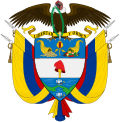Background
After the murder of presidential candidate Luis Carlos Galán in August 1989, students started a movement calling for a referendum "for peace and democracy" to be held on 21 January 1990. [3] However, under pressure from drug cartels, the government rejected the proposal. The students then set up the "We can still save Colombia" movement, which called for a referendum alongside the general elections on 11 March 1990 on establishing a Constitutional Assembly. The referendum saw 2,235,493 voted in favour and 117,000 vote against. [3]
Following the unofficial referendum, President Virgilio Barco Vargas issued decree 927 on 3 May calling a referendum on electing a Constitutional Assembly alongside the presidential elections on 27 May. [4] Although this was in violation of article 218 of the constitution, which gave Congress sole rights to reform the constitution, the referendum was approved by the Supreme Court. [4]
After 95% of voters approved of the election of the Assembly, elections were set for December. However, new President César Gaviria chose to reinforce the legitimacy of the Assembly by holding a second referendum on its election. [5] Only those who voted "yes" in the referendum could then cast a vote for the Assembly. [4]
The Assembly was elected by proportional representation in a single nationwide constituency. [6]
This page is based on this
Wikipedia article Text is available under the
CC BY-SA 4.0 license; additional terms may apply.
Images, videos and audio are available under their respective licenses.
